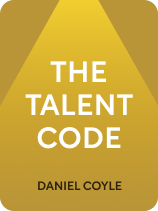

This article is an excerpt from the Shortform book guide to "The Talent Code" by Daniel Coyle. Shortform has the world's best summaries and analyses of books you should be reading.
Like this article? Sign up for a free trial here.
What is The Talent Code by Daniel Coyle about? What are the main takeaways of the book?
In The Talent Code, Daniel Coyle argues that with the right type of motivation, practice, and coaching, everyone has the potential for greatness. He helps you understand your brain’s natural skill-building process and explores the process of growing talent.
Read below for a brief overview of Daniel Coyle’s The Talent Code.
The Talent Code by Daniel Coyle
In The Talent Code, Daniel Coyle goes beyond the nature versus nurture debate and digs into the science of skill-building to answer the question, “Where does great talent come from?” Based on his research, he concludes that with proper practice, motivation, and guidance, anyone can take advantage of their biology to build and maintain talent.
Here we’ll explore Coyle’s findings in four parts:
- Part 1: Myelin Matters explores the neurological process of skill-building.
- Part 2: Meaningful Practice walks you through the key elements of the type of practice that meaningfully contributes to developing talent.
- Part 3: Impassioned Motivation dives into the motivational forces behind commitment to meaningful practice and the pursuit of talent.
- Part 4: The Role of the Coach focuses on how you can guide others toward talent.
Part 1: Myelin Matters
In trying to pinpoint the source of talent, Coyle discovered that talent isn’t something you’re born with—it’s something you develop throughout your life. Specifically, talent is directly proportional to the amount of myelin (fatty, speed-enhancing nerve insulation) in your brain: The more you work on growing your myelin, the more talented you become.
Part 2: Meaningful Practice
You’ve learned that you create myelin when you fire a specific neuron circuit repeatedly. But there’s a catch: To build myelin, this repetition has to be challenging. Coyle calls this challenging repetition deep practice. (Shortform note: We’ll refer to it as meaningful practice, so as to emphasize the importance of it being challenging in a meaningful—that is, myelin-growing—way.)
Part 3: Impassioned Motivation
As we’ve seen, meaningful practice takes significant time, patience, and effort. What would motivate someone to commit to this difficult work for years, or even for the rest of their life? Coyle found that this level of commitment requires a special type of motivation called impassioned motivation. In this section, Coyle discusses what impassioned motivation is, what triggers it, and how it contributes to building talent. He also explores what happens when this type of motivation is applied on a community-wide scale.
Part 4: The Role of the Coach
Now that you’ve learned about the role that practice and motivation play in building an individual’s talent, let’s discuss how you can use this knowledge to coach and cultivate talent in others.
In this section, Coyle explores five techniques that effective, talent-building coaches use, according to Coyle: motivational language, engaging feedback, precise instructions, skill-tailored training, and personalized guidance.

———End of Preview———
Like what you just read? Read the rest of the world's best book summary and analysis of Daniel Coyle's "The Talent Code" at Shortform.
Here's what you'll find in our full The Talent Code summary:
- A deep dive into where great talent comes from
- The key elements of the type of practice you need to develop talent
- Why it's never too late for greatness, if you know how to grow it






